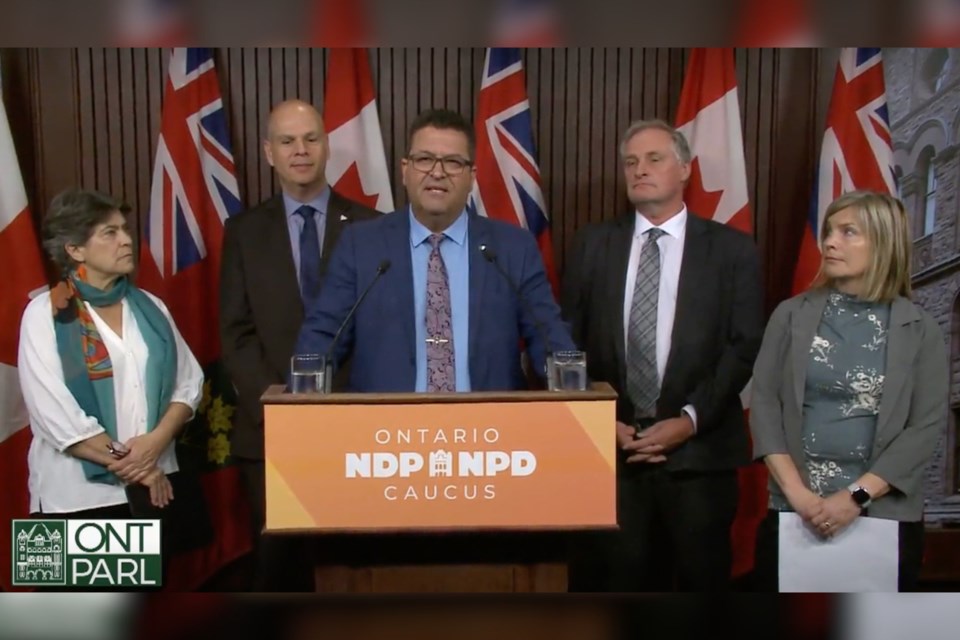TORONTO — The mayor of Nipigon joined a coalition of Northern Ontario MPPs calling on the province to take immediate action to improve safety on the region’s most critical roadways.
On Tuesday (June 4) morning at Queen’s Park, Mushkegowuk-James Bay MPP Guy Bourgouin introduced the Northern Highway 11 and 17 Safety Act, 2025, a Private Member’s Bill aimed at addressing the long-standing dangers on two of the province’s most vital and deadly corridors.
Joined by co-sponsors Thunder Bay-Superior North MPP Lise Vaugeois, Timiskaming-Cochrane MPP John Vanthof, Sudbury MPP Jamie West, and Nipigon Mayor Suzanne Kukko, Bourgouin urged the Ford government to work across party lines to get the bill passed.
“It’s about keeping people safe. It’s about making sure Ontarians get home alive,” said Bourgouin during the press conference.
“Conditions have worsened. That’s why we're back again, proposing concrete, common-sense solutions to protect northerners and all Ontarians who travel these roads every day.”
The proposed legislation calls for several key changes. It would require that weigh scales and truck inspection sites be staffed daily for at least 12 hours to hold commercial drivers accountable.
It also calls for OPP traffic enforcement to be sufficiently staffed to properly monitor the highways.
Bourgouin’s proposal would ensure truck drivers are tested and certified only by ministry examiners, helping eliminate cutting corners in driver training.
Finally, it aims to bring winter highway maintenance in Northern Ontario back under the direct management of the Ministry of Transportation, moving away from the current privatized model.
Bourgouin said that the bill builds on public consultations and years of advocacy, noting past efforts to improve winter maintenance, ban unsafe passing, and mandate winter driving training.
Kukko made the trip to Queen’s Park to show her support for the bill. For her, the stakes are deeply personal.
“We’re at the crossroads of Canada, meaning you can't cross Canada unless you go through Nipigon. So our area sees a ton of highway traffic, commercial and non-commercial in all seasons,” she said.
Kukko recounted multiple traumatic incidents.
“Back before COVID, I had hired a young intern from Thunder Bay. Her fiancé had just got a career job in our town, and their plan was to move to Nipigon,” she said.
“A week before she was to start, her partner died in a highway accident on his way to Nipigon to go to work.”
Kukko also experienced a near head-on collision with her children on Highway 11.
“As we turned a corner, a transport was passing on a solid line, and I had to swerve to avoid being hit head on. Then there's the school administrator that never came back to work in our community because of the deadly accident she witnessed on her daily commute,” she said.
“And I won't even go into the emergency workers who are off on extended leave because of what they have witnessed on our stretch of the highway.”
While the government has taken steps to increase safety on Highways 11 and 17, Kukko said there is “opportunity to do more.”
“How can I call myself an advocate for my community and not support this bill?” she said.
“This bill will prevent life-altering accidents. It will save lives.”
Vaugeois said much of the current danger stems from insufficient regulation of commercial trucking and privatized winter maintenance contracts that offer low wages and minimal benefits.
“Many new drivers are treated as indentured servants with little ability to demand driver and maintenance training,” said Vaugeois.
“If testing and licensing is done by ministry certified examiners, companies will be forced to make sure new drivers have the skills to pass the written and road tests.”
She added that the new $30 million inspection station in Shuniah is rarely staffed.
“And when it is, drivers can avoid the station by turning around at the Shuniah dump and waiting down the road at the Flying J until the station is closed again,” Vaugeois said.
“This is why we need people staffing that station for at least 12 hours a day.”
Vaugeois called for a return to public management of road maintenance, where workers would be properly paid, trained, and equipped for the job.
Vanthof pointed to the stark statistics facing northern drivers.
“Numbers don’t lie … If your car is registered in the District of Timiskaming and it’s involved in a traffic accident on a provincial highway, you're four times more likely to die than anywhere else in the province,” he said.
“That’s why we’re here … These are short-term, common-sense solutions that will have an immediate impact. And they will save people’s lives.”
Vanthof also criticized what he called a southern Ontario-centric view of highway infrastructure, noting that while urban projects like the Highway 401 tunnel often get attention, it’s the Trans-Canada Highway, running straight through the north, that truly keeps goods moving across Canada.
This is Bourgouin’s fourth private member’s bill on highway safety since he was first elected in 2018. Now serving his third term, he said he remains committed to pushing the province to act, regardless of who gets the credit.
“If you don’t like the colour of the bill, make it blue,” said Bourgouin. “It’s not about politics, it’s about saving lives.”
The bill is expected to be debated in the Ontario legislature this September.
